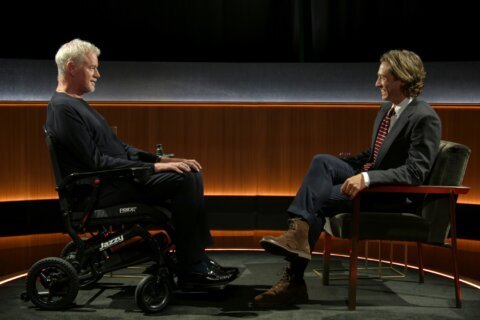Hear our full conversation on my podcast “Beyond the Fame.”
The New York Times ranked her among “The 25 Greatest Actors of the 21st Century.”
And on Tuesday, Alfre Woodard visits D.C. to host the inaugural gala of the John & Lillian Miles Lewis Foundation, named after the late Congressman John Lewis and wife Lillian Miles Lewis.
“He was the public-facing person, but she was his rock, his companion, his partner in all of this work,” Woodard told WTOP. “He was a young man when he stepped into the fray of the civil rights movement with Dr. [Martin Luther] King. … He was the only young person to speak at the March on Washington. … He was so committed to fairness, inclusion and people’s dignity.”
The event will be held at The Schuyler at The Hamilton Hotel on 14th Street Northwest at 6:30 p.m. It will feature a “Good Trouble Talk” between journalist Charlayne Hunter-Gault and Grammy winner Common, who will perform with a number of lawmakers in attendance.
“He was known as the conscience of the Congress,” Woodard said. “His actions on the Edmund Pettus Bridge where he was beaten bloody about the head, it was within the next three years when the Voting Rights Act was passed. From the time that was passed … the forces that did not want that to happen … millions of dollars went into play to pull it back.”
She says those forces are still at play today in our current politics.
“The voting rights struggle that we find ourselves in right now … all the gerrymandering for power to deny people the right to vote has been underway since it passed,” Woodard said. “People say, ‘What is my power?’ You have the power to vote. … You know the vote must be powerful or they wouldn’t be in such a hysterical and frankly immoral state trying to deny it.”
Woodard herself was born in Tulsa, Oklahoma, in 1952, just three decades after the city saw the Tulsa Race Massacre of 1921. Woodard was a high-school athlete when she joined a school play, inspiring her to study drama in college at Boston University.
“I am not going back into ancient history!” Woodard said. “I’ve been around so long, that’s like saying, ‘Remember this picture of you in kindergarten?’ … I’m not a legend, I’m just a working actor who’s been working for a long time and fortunately I’m a storyteller.”
She made her off-Broadway debut in the play “For Colored Girls Who Have Considered Suicide When the Rainbow Is Enuf” (1977), followed by her film debut in “Remember My Name” (1978) and an Oscar nomination for Martin Ritt’s “Cross Creek” (1983).
Her TV performances have earned four Emmys for “Hill Street Blues” (1984), “L.A. Law” (1987), “Miss Evers’ Boys” (1997) and “The Practice” (2003), as well as memorable performances from “St. Elsewhere” (1985-1988) to “Homicide: Life on the Street” (1993).
“I don’t have favorites. I’m all about the process,” Woodard said. “When I think about the projects that I still hold dear, it’s because of the people that I worked with and the sense of family that happens when you create together, because you have to trust each other. … How we live every day is going into the trenches. It is not pretty; it’s tough-ass work.”
On the big screen, she starred in “Passion Fish” (1992), “Primal Fear” (1996), “Star Trek: First Contact” (1996), “Captain America: Civil War” (2016), Disney’s live-action remake of “The Lion King” (2019) and even the Best Picture winner “12 Years a Slave” (2013).
“Awards are lovely, but they’re not really the point,” Woodard said. “The point is how somebody felt when they come [home], sit around in their drawers because they’re tired from being at work or are out looking for work and flick that on and say, ‘OK, Alfre’s there, let’s see what she’s got to say,’ or, ‘Man, it costs $15 for a movie on a big screen? OK, I can depend on Alfre.'”
Her latest project is executive producing the eight-part miniseries “The Porters” on BET+.
“I am so proud of the young people who have brought their gifts to this story, the ones that wrote it, directed it, produced it,” Woodard said. “It’s about the porters who established the Brotherhood of Sleeping Car Porters … who ran the line between Montreal and Chicago in 1921. The two leads come back from the first World War. You can imagine the things they faced.”
And so, the civil rights struggle continues in the stories we tell about our past.
“[Lewis] left us with an incredible legacy that, although we miss him tremendously, we now have the tools and a map,” Woodard said. “Old people in the South used to say, ‘Freedom ain’t free.’ You struggle for it, but every piece of it that you get, you have to protect it every day, because people’s fear and greed never rests, so all of us citizens can never rest.”
Hear our full conversation on my podcast “Beyond the Fame.”








